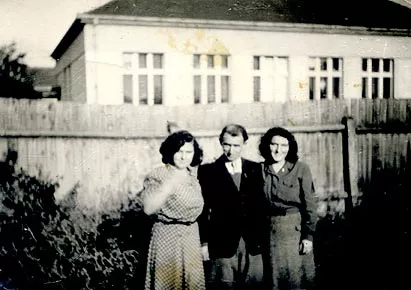Ruzena Deutschova, her father and sister Hana
This picture was taken in 1946, of me, my father and Hana, my younger sister.
After this, Hana immigrated to Israel, this was our last picture together. The photo was taken on the premise that my father and sister might never meet again. When this was taken, there was still a garden here. The Galanta post office building is seen in the background.
I was together with Hanna in the Allendorf labor camp [a sub-camp of Buchenwald]. When we were liberated, we went home together. Hana stayed a while in Galanta, but in spring of 1946, she went to Kassa, and left from there with her later husband for Palestine. They captured the boat, the passengers were forced to debark in Cyprus. I wrote letters to her, and she sent pictures from there. They went by boat from Cyprus on to Israel. There she was conscripted as a soldier.
Following the war, my father got married. Fina Messinger was the sadchen for Father and his new wife. Father's new bride-to-be, Sara Schiffer, lived in Pest with her siblings. She was from an orthodox Jewish family in Satoraljaujhely. Since one of her older brothers had taken a non-Jewish wife before the war, they expelled him from the family.
I don't even know where the wedding was held. I was with my father's sister at the time, with Etel in Prague. I lived for a time with Father's new family, up until I got married. I didn't like them at first, so I didn't call her Mother, but rather Aunt Sari. Later, my children also called her Aunt Sari and that was very painful for her. When my father died, my husband said, 'Sarika you are a guest at our house every Saturday.' She appreciated this very much and came every Saturday for lunch.
My father stopped eating kosher in 1958, that is, he had an argument with the rabbi. He lived with Rabbi Katz in one apartment at the time, the rabbi had to split up his apartment [share-renting], and if my father hadn't occupied it, they would have put a person there who raised pigs. There was no way the Galanta Jews would have liked to have pigs raised in the synagogue courtyard. So, my father ended up there. Katz didn't have children, so he was left with only one room and a kitchen. My father and his second wife likewise got one room and a kitchen. Rabbi Katz was an irascible, earth-bound person, may he rest in peace. The misunderstandings intensified until the end when Rabbi Katz did something which, according to the spirit of Jewish law, he shouldn't have. He refused to slaughter a duck my father had brought him to slaughter. My father grabbed the duck and slaughtered it in front of him. After that it was treyf. Five years later, when my father died, Rabbi Katz himself got over it, and he gave such a beautiful speech, as if nothing had ever happened between them.
My father was buried in Galanta in 1963 with Orthodox rites. Rabbi Katz said the funeral speech, but he didn't go himself into the cemetery, he just stayed in the vestibule. Rabbi Katz was a kohen. Two Jews were buried that day in Galanta, this had only happened once since the war. The other person who died was Mr. Blum. My father was buried in the morning, Mr. Blum that afternoon. The weather was horribly hot.












